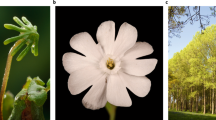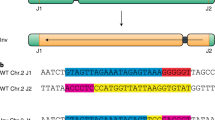Abstract
STUDIES on the chromosome behaviour of a large number of vegetatively propagating plants have revealed certain interesting facts. The investigations have mainly centred around members of the Aroideae, Liliaceae, Amaryllidaceae and Dioseoreaceae, including the ornamental ones, especially those with obligate vegetative multiplication1.
This is a preview of subscription content, access via your institution
Access options
Subscribe to this journal
Receive 51 print issues and online access
$199.00 per year
only $3.90 per issue
Buy this article
- Purchase on Springer Link
- Instant access to full article PDF
Prices may be subject to local taxes which are calculated during checkout
Similar content being viewed by others
References
Sharma, A. K., and Das, N. K., Agric. Lusit., 16, 23 (1954). Sharma, A. K., and Bhattacharyya, N. K., Proc. Abst. 41st Ind. Sci. Congr., 147 (1954). Sharma, A. K., and Bal, A. K., ibid., 148 (1954). Sharma, A. K., and De, D., ibid., 248 (1955). Sharma, A. K., Genetica, 27, 323 (1955). Mookerjea, Archana, Caryologia, 7, 1 and 221 (1955).
Sharma, A. K., Caryologia (in the press).
Author information
Authors and Affiliations
Rights and permissions
About this article
Cite this article
SHARMA, A., SHARMA, A. Fixity in Chromosome Number of Plants. Nature 177, 335–336 (1956). https://doi.org/10.1038/177335a0
Issue Date:
DOI: https://doi.org/10.1038/177335a0
This article is cited by
-
Chromosome number and modal karyotype in a polysomatic endangered orchid, Bulbophyllum auricomum Lindl., the Royal Flower of Myanmar
Plant Systematics and Evolution (2011)
-
Genetic control of chromosome behaviour: Implications in evolution, crop improvement, and human biology
The Nucleus (2010)
-
Change in chromosome concept
Proceedings / Indian Academy of Sciences (1978)
-
Chromosome studies in species ofDracaena with special reference to their means of speciation
Journal of Genetics (1960)
-
Karyotype studies inCestrum as an aid to taxonomy
Genetica (1959)
Comments
By submitting a comment you agree to abide by our Terms and Community Guidelines. If you find something abusive or that does not comply with our terms or guidelines please flag it as inappropriate.



